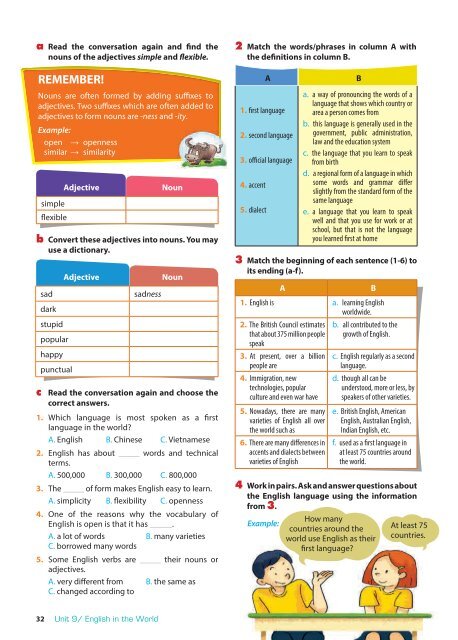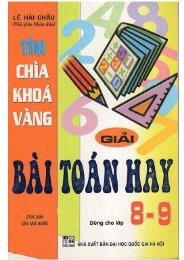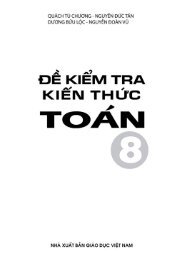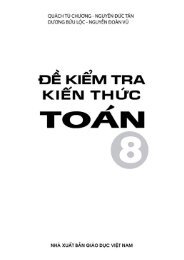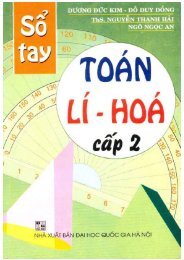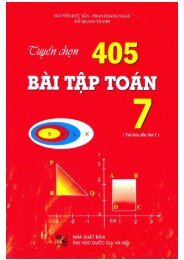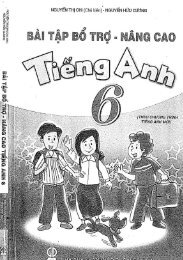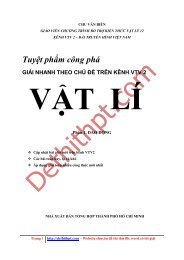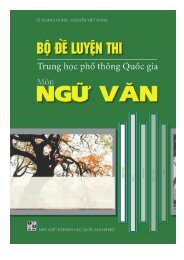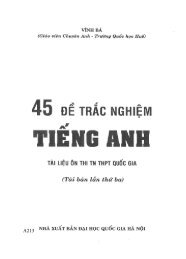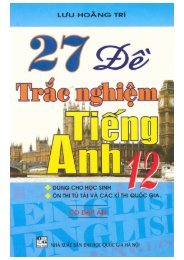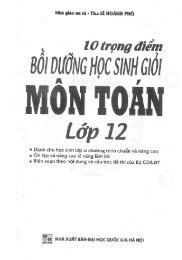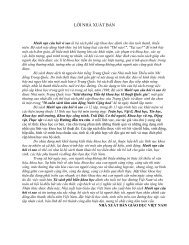Sách giáo viên Tiếng Anh 9 Thí điểm 2 tập (Pilot English 9 for Teacher)
https://app.box.com/s/rnv2yu1duebjhdpkknu2l47p9nmel5ax
https://app.box.com/s/rnv2yu1duebjhdpkknu2l47p9nmel5ax
Create successful ePaper yourself
Turn your PDF publications into a flip-book with our unique Google optimized e-Paper software.
a Read the conversation again and find the<br />
nouns of the adjectives simple and flexible.<br />
REMEMBER!<br />
Nouns are often <strong>for</strong>med by adding suffixes to<br />
adjectives. Two suffixes which are often added to<br />
adjectives to <strong>for</strong>m nouns are -ness and -ity.<br />
Example:<br />
open → openness<br />
similar → similarity<br />
simple<br />
flexible<br />
b Convert these adjectives into nouns. You may<br />
use a dictionary.<br />
sad<br />
dark<br />
stupid<br />
popular<br />
happy<br />
punctual<br />
Adjective<br />
Adjective<br />
sadness<br />
Noun<br />
Noun<br />
c Read the conversation again and choose the<br />
correct answers.<br />
1. Which language is most spoken as a first<br />
language in the world?<br />
A. <strong>English</strong> B. Chinese C. Vietnamese<br />
2. <strong>English</strong> has about ______ words and technical<br />
terms.<br />
A. 500,000 B. 300,000 C. 800,000<br />
3. The ______ of <strong>for</strong>m makes <strong>English</strong> easy to learn.<br />
A. simplicity B. flexibility C. openness<br />
4. One of the reasons why the vocabulary of<br />
<strong>English</strong> is open is that it has ______.<br />
A. a lot of words B. many varieties<br />
C. borrowed many words<br />
5. Some <strong>English</strong> verbs are ______ their nouns or<br />
adjectives.<br />
A. very different from B. the same as<br />
C. changed according to<br />
2 Match the words/phrases in column A with<br />
the definitions in column B.<br />
A<br />
1. first language<br />
2. second language<br />
3. official language<br />
4. accent<br />
5. dialect<br />
3 Match the beginning of each sentence (1-6) to<br />
its ending (a-f).<br />
A<br />
B<br />
1. <strong>English</strong> is a. learning <strong>English</strong><br />
worldwide.<br />
2. The British Council estimates<br />
that about 375 million people<br />
speak<br />
3. At present, over a billion<br />
people are<br />
4. Immigration, new<br />
technologies, popular<br />
culture and even war have<br />
5. Nowadays, there are many<br />
varieties of <strong>English</strong> all over<br />
the world such as<br />
6. There are many differences in<br />
accents and dialects between<br />
varieties of <strong>English</strong><br />
b. all contributed to the<br />
growth of <strong>English</strong>.<br />
c. <strong>English</strong> regularly as a second<br />
language.<br />
d. though all can be<br />
understood, more or less, by<br />
speakers of other varieties.<br />
e. British <strong>English</strong>, American<br />
<strong>English</strong>, Australian <strong>English</strong>,<br />
Indian <strong>English</strong>, etc.<br />
f. used as a first language in<br />
at least 75 countries around<br />
the world.<br />
4 Work in pairs. Ask and answer questions about<br />
the <strong>English</strong> language using the in<strong>for</strong>mation<br />
from 3.<br />
How many<br />
Example:<br />
countries around the At least 75<br />
world use <strong>English</strong> as their countries.<br />
first language?<br />
B<br />
a. a way of pronouncing the words of a<br />
language that shows which country or<br />
area a person comes from<br />
b. this language is generally used in the<br />
government, public administration,<br />
law and the education system<br />
c. the language that you learn to speak<br />
from birth<br />
d. a regional <strong>for</strong>m of a language in which<br />
some words and grammar differ<br />
slightly from the standard <strong>for</strong>m of the<br />
same language<br />
e. a language that you learn to speak<br />
well and that you use <strong>for</strong> work or at<br />
school, but that is not the language<br />
you learned first at home<br />
32 Unit 9/ <strong>English</strong> in the World


